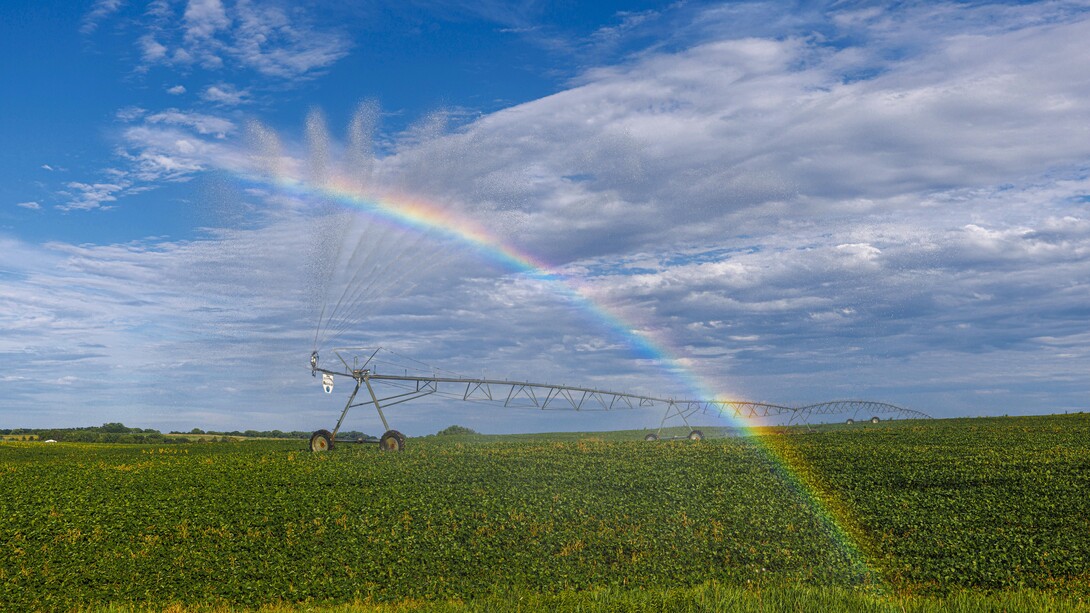
By Geitner Simmons | IANR Media
Name a major Nebraska water issue, and it can involve an array of players — local stakeholders, but also natural resources districts, irrigation boards, state regulators, local governmental boards and sometimes the government of a neighboring state.
As a result, success in addressing irrigation regulation, flood control, nitrate regulation and other water issues not only requires a solid understanding of relevant science, law and policy, but leadership skills that build consensus.
“Having the skill to appreciate each person’s perspective and get everyone working collaboratively to solve these very complex problems is more important than ever,” said Mark Burbach, a geoscientist in the University of Nebraska–Lincoln’s School of Natural Resources.
Burbach has a scientific background in agrichemical contaminants and water resource management, as well as a doctoral degree in leadership development.
“We need to increase our leadership capacity to be able to match the increasing complexity of the natural resources and the environmental changes that are going on,” he said.
The Nebraska State Irrigation Association has long recognized this need, and to address it the association partnered with the university in 2011 to create a multidisciplinary training program known as the Nebraska Water Leaders Academy.
Each year, the academy brings together 15 to 25 early- to mid-career Nebraska professionals from a range of fields. Participants attend six two-day sessions throughout the year that cover different aspects of the “three pillars” of water management: natural resources science, law and policy, and leadership training.
The program’s Nebraska-specific natural resources topics include climate/weather, geology, water needs in the state’s regions, and water’s relationship to public health. Participants learn about Nebraska water law, Natural Resource District history and interstate water compacts.
Burbach, with the School of Natural Resources’ Conservation and Survey Division, has worked with the academy since its inception. He developed and oversees the academy’s leadership training components, including communicating strategically, communicating across differences, risk communication and leadership skills to facilitate innovation.
Burbach has coordinated with more than 50 faculty members from University of Nebraska campuses, including Nebraska Extension educators from across the state, as they prepare presentations for academy sessions.
“There’s a need to have leaders who can appreciate that scientific and legal complexity and work collaboratively with others within that very complex context,” Burbach said.
In all, the academy provides wide-ranging, multidisciplinary instruction and provides trips across Nebraska so participants can learn firsthand about different regions’ water needs. The experience facilitates networking and concludes with team projects that address real-world Nebraska water issues.
“That was such a rewarding experience for me,” said academy alumna Marie Krausnick, assistant general manager for the Upper Big Blue NRD. “It gave me the opportunity to network with a group that held similar and different points of view surrounding water, recreation, economic development and agriculture. It was awesome.”
The academy experience “taught me the complexity and diversity involving all water uses across the state of Nebraska,” said Matt Lukasiewicz, general manager of the Loup Basin Reclamation District, Farwell Irrigation District and Sargent Irrigation District. “This made me recognize the value of this resource and the importance to work with others within the water industry, to help create fair water policy.”
The visits around Nebraska to learn about the state’s varied water management needs were eye-opening, Krausnick said.
“I had never been to the Panhandle to see how surface and groundwater work together to keep the economy going,” she said. “Or to Omaha to see how Papio-Missouri NRD works to protect against flooding or how the Metropolitan Utilities District handles stormwater runoff and about the challenges with urban development on their systems.”
Each year, the academy develops a list of projects that participants can focus on in teams.
“We reach out to alumni for ideas so the class can work together collaboratively on a real-world issue, to fill a gap that isn’t being filled for lack of resources or whatever,” said Burbach, who worked as a scientist with the Nebraska Water Center for 15 years.
In 2023, one team identified possible rehabilitation options besides dredging for Lake Babcock at Columbus. The academy shared the information with the Loup Power District. Another team prioritized areas for wellhead protection delineation and shared the information with the Nebraska Department of Environment and Energy.
A third team compiled climate data resources on the Platte River watershed. Audubon Great Plains and other stakeholders received the information.
The academy now has 216 alumni, facilitating constructive networking and consultation. Many of the alumni hold leadership positions in local, state and national organizations involving natural resources management.
When the yearlong academy session is complete, Burbach always asks the participants how they intend to use what they have learned to move forward.
“It’s always fun to hear what their plans are, and then to follow up and see that, yes, they did it,” he said.
Many of the alumni step up to serve on local civic boards and commissions in addition to their work on water issues.
“With our over 200 alumni, we're really seeing impact,” Burbach said.
More details at: https://waterleadersacademy.org/